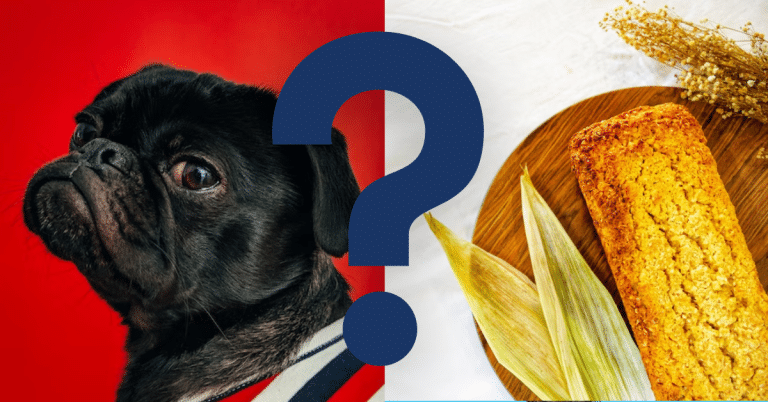Can Dogs Eat Sourdough Bread? A Vet’s Opinion

Sourdough bread is created from fermented dough that contains naturally occurring wild yeast and bacteria, but can you feed sourdough bread to your dog?
Dogs can consume tiny portions of sourdough bread without becoming ill, although it is not recommended. Sourdough bread may include salt, sugar, or even poisonous compounds harmful to dogs. Weight gain and digestive difficulties might also result from the high carbohydrate intake. Furthermore, certain dogs may be sensitive or allergic to gluten, which is contained in bread. It’s essential to provide your dog with a balanced and appropriate diet that focuses on their nutritional needs and avoid offering them sourdough bread as a frequent treat.
Benefits Of Sourdough Bread For Dogs
While sourdough bread is not explicitly made for dogs and shouldn’t serve as a staple in their daily diet, there are a few potential benefits to occasionally feeding sourdough bread to dogs:
Digestive Health
Fermentation in sourdough bread produces lactic acid, which can help dogs maintain healthy gut microbiota. A healthy gut flora can help with digestion and nutrition absorption.
Reduced Allergenicity
Compared to commercially processed bread, sourdough bread is sometimes more straightforward for dogs with particular sensitivities to tolerate. Some proteins and gluten are broken down during the extended fermenting process, which may reduce allergic reactions in sensitive dogs.
Natural Components
Sourdough bread may be created using simple, healthy components like flour, water, and salt. It makes it a healthier option than store-bought bread, which may contain preservatives, fake flavors, or harmful ingredients.
Despite these possible advantages, it is crucial to highlight that sourdough bread should only be served as a rare treat in modest quantities. Dogs’ dietary demands differ from those of humans, and their primary diet should consist of balanced dog chow that fits their specialized nutritional requirements. Contacting a veterinarian before introducing any new food into your dog’s diet is always advised to verify it is safe and suited for your specific dog breed.

How To Safely Give Sourdough Bread To Dogs
If you choose to give your dog sourdough bread as a treat on occasion, follow these instructions to keep them safe:
Quality Ingredients
Ensure that the sourdough bread you serve to your dog is handcrafted or purchased from a reputable bakery. Commercial bread may include dangerous ingredients or too much salt, harming your dog’s health.
Minimal Ingredients
Look for sourdough bread with few ingredients, preferably made with whole wheat or rye flour, water, and a pinch of salt. Avoid bread containing onions, garlic, raisins, or other dog-toxic substances.
Portion Control
Sourdough bread should only be given to dogs as a treat on rare occasions. Instead of an entire slice, use a few small pieces or crumbs. It helps to prevent intestinal disorders and keeps their diet balanced.
Monitor For Any Adverse Reactions
When giving your dog sourdough bread, always keep an eye on them. It allows you to spot any adverse reactions or potential choking concerns. Avoid giving bread with crusts or firm edges to reduce the danger of choking.
Check For Allergies Or Sensitivities
Some dogs may be sensitive or allergic to gluten or other bread ingredients. When introducing sourdough bread, watch for any signs of allergic reactions in your dog, such as itching, diarrhea, or vomiting. Stop feeding bread immediately and consult a veterinarian if any negative signs appear.
Moderation Is Key
While sourdough bread may have certain benefits, it should not be used in place of a well-balanced dog diet. Bread, notably sourdough, is high in calories and, if taken in excess, can contribute to weight gain and nutritional imbalances. To minimize health problems, limit yourself to small, infrequent servings.
Consult A Veterinarian
Before introducing any new food into your dog’s diet, including sourdough bread, it’s always a good idea to consult your veterinarian. They may provide personalized recommendations based on your dog’s health, dietary demands, and concerns.
While little amounts of sourdough bread may be suitable for some dogs, it should never constitute a substantial portion of their diet. Please provide them with a balanced and adequate diet that meets their nutritional needs.
Will Sourdough Bread Make A Dog Sick?
While sourdough bread is not ordinarily toxic to dogs, it might cause digestive troubles or make them sick if taken in excessive quantities or if it includes harmful substances. The following are some of the potential issues with offering sourdough bread to dogs:
Digestive Issues
Dogs’ digestive systems differ from humans’, and eating bread, especially in large quantities, might cause stomach pain, bloating, gas, or diarrhea. Bread’s high carbohydrate content and complex character can make it difficult for dogs to digest.
Gluten Sensitivity
Some dogs may be gluten sensitive or intolerant, a protein in wheat and other grains. Gluten may still be present in sourdough bread. However, it may have been partially broken down during fermentation. If dogs with gluten sensitivity ingest bread regularly, they may have allergic responses or gastrointestinal difficulties.
Obesity
Bread, notably sourdough, has a lot of calories and carbohydrates. Feeding your dog excessive amounts or regular servings of bread can contribute to weight gain, leading to obesity and other health issues.
Toxicity
Store-bought or commercially processed sourdough bread may contain harmful substances such as onions, garlic, raisins, or artificial additions. These ingredients can cause serious health problems, such as organ damage or failure, and should be avoided at all costs.
Allergic Reactions
Certain ingredients in sourdough bread, such as rye, wheat, or other substances, may cause allergic reactions in some dogs. Allergic responses can cause skin problems (itching and redness), stomach distress, and breathing problems. If your dog exhibits any allergic reaction symptoms, stop eating sourdough bread and visit a veterinarian.
It is critical to remember that dogs have unique nutritional requirements, and their diet should primarily consist of well-balanced and appropriate dog food. While small portions of plain, homemade sourdough bread may not cause immediate harm to most dogs, you should contact a veterinarian for personalized advice based on your dog’s health, dietary needs, and any particular issues.
Can dogs eat sourdough bread variations?
Dogs should refrain from consuming sourdough bread varieties that contain components other than the basic sourdough recipe. The following sourdough bread varieties usually are not recommended for dogs:
Garlic Sourdough Bread: Garlic is poisonous to dogs and can cause red blood cell destruction, resulting in anemia. Avoid giving your dog any bread that contains garlic.
Onion Sourdough Bread: Onions are harmful to dogs, whether powdered, uncooked, or cooked. They can cause gastrointestinal distress, damage to red blood cells, and perhaps lead to more severe health problems.
Herbs and spices Sourdough Bread: Herbs, spices, and other ingredients may be added to some sourdough bread varieties. While in tiny amounts, these chemicals are not dangerous; they can induce stomach distress or allergic reactions in sensitive dogs.
Fruits and nuts Sourdough bread containing fruits like raisins, currants, or nuts like walnuts, macadamia nuts, or almonds are possibly hazardous to dogs. Even small doses of raisins and currants can harm dogs and induce kidney failure. Some nuts are poisonous or can cause choking.
Sweetened Sourdough Bread: Avoid sourdough loaves with additional sugars or sweeteners. Excess sugar consumption can lead to obesity, dental difficulties, and the development of diabetes or other health concerns in dogs.
Before feeding your dog any sourdough bread variety, carefully study the ingredients. Stick to plain, homemade sourdough bread made with simple, dog-safe components such as flour, water, and a little salt. When in doubt, always speak with a veterinarian to ensure that the bread variety is safe for your dog.

Vet’s Summary
In conclusion, while dogs can occasionally consume small portions of basic, homemade sourdough bread as a treat, it is critical to be vigilant about the variations and ingredients used. Sourdough bread varieties containing hazardous substances such as garlic, onions, raisins, or nuts should be avoided by dogs. Bread with added sugars or sweeteners should also be avoided. Excessive sourdough bread or bread containing undesirable substances can cause digestive distress, weight gain, allergies, or even dog poisoning. Always prioritize healthy and appropriate food for your dog, and get personalized guidance from a veterinarian.
Given the potential gastrointestinal benefits of sourdough bread for dogs, probiotic supplements may benefit your dog’s overall gut health. Probiotics can aid digestion, nutrition absorption, and immunological function by promoting a healthy gut flora balance. However, before introducing new supplements into your dog’s diet, you should contact a veterinarian. Based on your dog’s specific needs and health condition, a veterinarian can advise you on the best probiotic supplement, dose, and duration. They can also determine whether probiotics are required or suggest alternative techniques for supporting your dog’s digestive health. Remember that professional counsel is required to ensure your pet’s well-being.
Videos To Watch
If you are wondering what related foods are good to give your dog, watch this:
And if you want to know what a dog can NOT eat, watch this:






